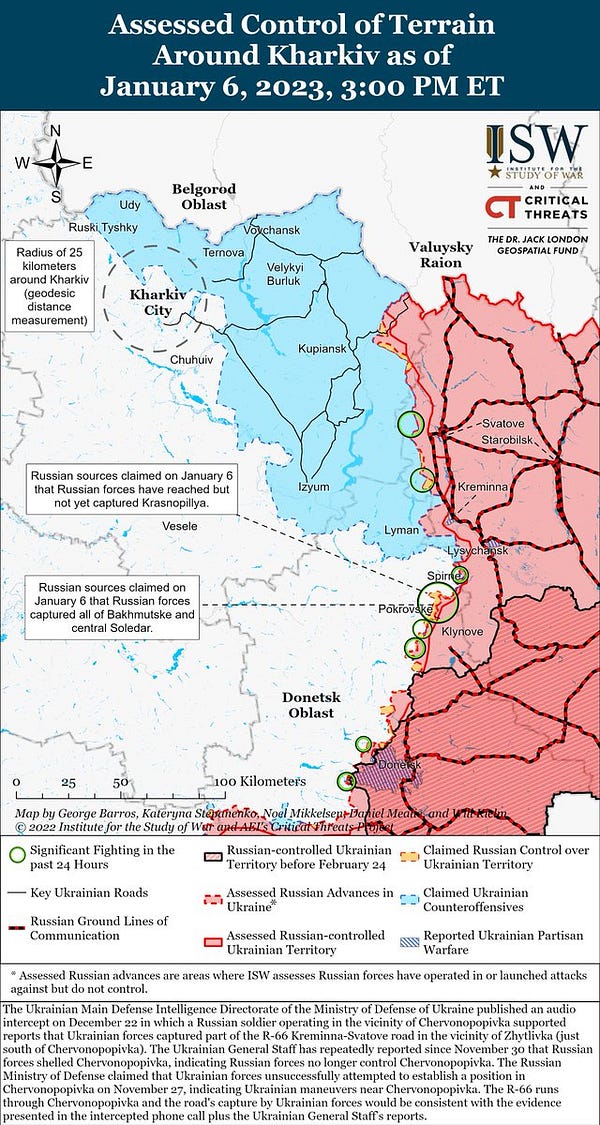Jan 7 The Saturday Edition
Day 317: Kharkiv RUattacks RUmobilisation Italy UAsanctions Estonia USsanctions Crimea GRU Gabriel Harry OrthoXmas toilets-A&Ps- UKDef ISW Zelensky Belton Jackson Mendel Zabrinsky
Catching up
Hop over the Scott Lucas’s EA Worldview for the latest up-dates from the US and the Middle East as well as Europe.

Stories we’re following…
Russia forces continue to attack civilian areas across Ukraine despite Putin’s declaration of 36-hour ceasefire from noon on Friday. Attacks over past 24 hours in 7 regions in southern and eastern Ukraine kill at least 3 people and injure 14.
Air raid alerts sounded across Ukraine just hours after Russia called a ceasefire. There were no immediate reports of attacks on Ukraine, and the alert was allegedly triggered by the launch in Belarus of a MiG-31K fighter jet.
Fighting between Russian and Ukrainian forces has continued at a “routine level” into the Orthodox Christmas period, the UK Ministry of Defence says.





Estonian intelligence: Russia never stopped mobilization drive. Estonia's Intelligence Chief Margo Grosberg believes Russia is about to announce a new mobilization drive. However, he said that since the 1st wave in the fall, mobilization in Russia has never actually stopped.
President Zelensky has praised the US for including tank-killing armoured vehicles in its latest multibillion-dollar package of military aid, saying they are “exactly what is needed” for troops locked in combat against Russian forces. He said,
“For the first time, we will get Bradley armoured vehicles – this is exactly what is needed. New guns and rounds, including high-precision ones, new rockets, new drones. It is timely and strong.”
The US has asked Italy to provide Italian-French SAMP/T air defence systems to Ukraine during a conversation between two officials. National security adviser Jake Sullivan asked Francesco Talo, an adviser to the Italian PM, Giorgia Meloni, for Rome to provide the systems as soon as possible, according to the Italian newspaper La Repubblica.

President Zelensky signed a decree implementing economic sanctions against a number of Russian celebrities who supported the war, his office announced on Saturday. The list targets 119 individuals, including Russian singers, actors, and television personalities.
Estonia is on path to become the first country to monetize Russian frozen assets and transfer them to Ukraine. The Estonian Foreign Affairs Ministry and Ministry of Justice are developing the needed legal basis and will present a draft proposal to the government next month.
On January 6, the US issued new Iran-related sanctions targeting six individuals linked to Quds Aviation Industries and one linked to Iran's Aerospace Industries Organization, according to the U.S. Treasury Department. The sanctions apply to “executives and board members” of the two companies, which the department said are involved in the production of Iranian drones that Tehran has transferred for use in Russia’s war against Ukraine.
Following Moscow's illegal annexation of Crimea in 2014, the Ukrainian peninsula experienced a real estate boom, as many Russians rushed to buy beachside properties. By the start of 2022, prices had been increasing by around 60 percent per year, according to some estimates. The property gravy train came off the rails, however, once Moscow launched its unprovoked invasion of Ukraine in February. House prices in Crimea are estimated to have declined by almost 10 percent on average in 2022, and the course of the war in Ukraine looks set to exacerbate the situation even further.


Prosecutors in Poland have charged two men, a Belarusian and a Russian, with spying for Russia's military intelligence, the GRU, a spokeswoman of the Polish Prosecutor-General’s Office said on December 4. The two men, whose identities were not disclosed, were apprehended in April for allegedly collecting classified data related to Poland's military and face up to 15 years in prison if convicted.
Peter Gabriel dedicates new song ‘Panopticom’ to Ukraine war crime detectives and calls for a ‘data globe’. ‘We are beginning to connect a like-minded group of people who might…allow the world to see itself better and understand more of what’s really going on,’ said the Sledgehammer singer.
Prince Harry on Friday faced a backlash in the UK and beyond over his memoir "Spare", with criticism from the media, commentators, army veterans and even the Taliban, while Buckingham Palace kept silent on the widely leaked contents.


Orthodox Christmas
A dispatch from Reuters’ reporter in Warsaw, Poland, as Ukrainian refugees mark Christmas.
Victoria, a Ukrainian refugee, is celebrating Orthodox Christmas in Poland with a simple prayer – that next year she will be back at home. The 40-year-old is one of the millions of Ukrainians who have fled the Russian invasion of their homeland and are marking the holiday with mixed emotions – relief that they are safe, but sadness to be away from their families.
“The important thing is that it’s still a family holiday … We hope to celebrate next Christmas with our family back home,” Victoria said.

Triggering Russia…
I’ve included President Zelensky’s latest address for the Russian forces because I had the strangest conversation today and it connects with this post. Apparently, Russian bots and trolls get triggered by any mention of their soldiers taking toilets back to Russia. Try mentioning ‘toilets’ and ‘Russians’ in the same sentence and you’ll get a Russian bot swarm immediately.
James Jackson, 'I was praying we would die quickly', Mariupol survivor says- Euronews
When Lia and Alex woke up in Mariupol to the loud booms of explosions and shrieks of car alarms on 24 February, the young Ukrainian couple did not expect they would soon have to bury their loved ones in their own garden and fend off cold and starvation as Russian troops pounded the southern port city into dust.
Yet, they managed to survive and leave a city that now lies in ruins, narrowly escaping death in Russian bombardments, and avoiding being captured by Moscow's soldiers as they hunted for any Mariupol defenders.
The pair are now sitting at the newly-formed Lemkin Centre for Investigating Russian War Crimes' office in Berlin, telling their story in vivid detail as part of a programme collecting witness testimonies about war crimes to help tribunals, journalists, and future historians build a case against those responsible.


Zarina Zabrinsky, Big Lies & Rotten Herrings17 Kremlin Disinformation Techniques You Need to Know Now- Byline Times (must read)
For all 17 Kremlin disinformation techniques, read the full article- it’s well worth your time.
According to experts, Russia has been trying to destabilise Europe through disinformation since 2015. However, it was the aftermath of the 2016 US Presidential elections that attracted international attention to the issue as US intelligence agencies called out Russia’s propagation of false news and inflammatory media stories meant to sway the vote in Donald Trump’s favour. There’s one principal goal to Russia’s disinformation efforts: weaken the Western democratic system from within. While RT and Sputnik use a plethora of disinformation techniques derived from the Soviet era, we are concentrating on the most pertinent ones in the Kremlin’s playbook.
Pushing Kremlin Narratives
The Kremlin has been working on creating a new “post-Western world order” narrative, in which Western countries and institutions are no longer enjoying the same amount of power and influence they once did. Major Kremlin narratives include negative narratives: anti-elite, anti-EU, anti-NATO, and promote a danger discourse (the rising extremist, migrant and Islamic terrorism threat) and positive narratives: Russia and Putin as saviours of traditional values.


Robert Coalson, Coming Apart At The Seams? For Russia's Ethnic Minorities, Ukraine War Is A Chance To Press For Independence From Moscow- RFE/RL
Putin’s war in Ukraine has already lasted far longer and proven far more costly than Moscow anticipated in many ways. As it continues with no sign of an end, many observers say centrifugal forces are growing in the vast and highly centralized Russian Federation. These forces, they argue, will strengthen as the pressures of the war and unprecedented economic sanctions erode Moscow’s leverage over Russia’s regions, from the Baltic and Black seas to the Pacific.
“The goal of this forum,” read a statement from the July meeting in Prague of the Forum of Free Peoples of Russia -- a gathering of anti-Putin, anti-war groups that has met four times since the war began -- “is the complete and irreversible decolonization of Russia. Our goals will have been achieved only when the Russian Federation ceases to exist as a subject of international law and is transformed into 25-35 independent, free, and – we hope – democratic countries.”
“I see a certain disorder in the governing system,” said political analyst Dmitry Oreshkin. “The power vertical they have been building…is beginning to shake at a critical moment.
“If Putin loses the war – and that is a very realistic possibility – then I don’t see any legal means to change the government. As a result, the siloviki will settle things among themselves,” he said, referring to the leaders of the military and security agencies.










